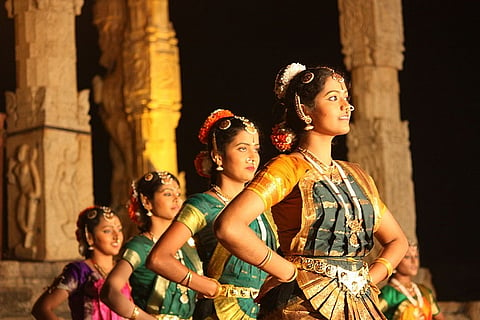

When a fresh debutant who has finished her of his arangetram aspires to perform on stage, the advice given by their teachers, family members and friends is to apply to the sabhas of the city for a slot in the December festival. They are asked to submit a bio-data and photograph with a letter of interest to every sabha as that is the norm. They may, in some cases, receive an acknowledgement for their submission from the sabhas.
The general belief is that sabhas are scouting agencies for fresh talents. Therefore, young dancers hold their breath for over nine months (they are asked to apply at least nine months in advance) to see if their talent gets recognized. They hope against hope that they will get an opportunity because they have put in extra effort to achieve that beautiful araimandi (basic stance in Bharatanatyam), spent all their hard earned internship money in stitching a new silk costume or begged their father to let them attend an expensive workshop conducted in some exotic city so that they can learn one varnam or tillana which they yearn to perform.
The month of August comes and they hear their peers talk about their December season concerts already. No letter in sight, they console themselves saying this must be the first list, and await the second one. September passes by, in deafening silence from sabha quarters. Comes October and November and it rains announcements about season performances, of dancers they know, and they don’t, young and old. Disappointed, the young dancer picks up courage to call the sabha secretary. “Sir, my name is so and so, I had applied in March this year for a slot.” To this comes the customary reply “but all the slots are filled up, my dear. Do apply next year at least a month in advance, in February itself.” But there is a rider, “By the way do drop a word to so and so dancer or dance-guru. She/he is in charge of all our slots. Hope you are in their good books?”
What? How can a particular dancer or dance-guru be in charge for all the slots in a sabha? How is this selection process democratic or independent if a particular dancer chooses who all must and mustn’t perform in a sabha? Must one necessarily know this person to perform at all? Would it help if I call that dancer or guru and butter them up? How is this fair? Keep asking the questions, and you will find that the final answer is moolah.
As we often hear, sabhas claim they incur losses while they conduct a dance festival. No ticket sales, not enough audiences and several other such excuses are given. To solve their problems have arrived a new savior class amongst the art fraternity, the ones with the money.
I have discovered recently that some of the city’s prominent sabhas have allowed the underwriting of their entire selection process and program allocation for a fixed fee. By doing this they are offered a minimum guarantee amount for running the seasonal festival by a dancer or dance-guru, who then becomes the kingpin in the selection of artistes. This basically covers the sabhas costs and perhaps even gives them a bit of a profit. Meantime, these underwriters, most of whom are prominent dance teachers or dancers or sometimes even publicists, start to distribute all the slots they have bought, either to their own students for a hefty fee or their favourite dancers or dancers who are in their good favors. They also sell it to other dancers who will pay the fixed price.
This sort of wholesale selling of slots to such agents (guised as advisors) is a further abyss in the moral corruption that the field faces. Must we continue to turn a blind eye to blatant overthrowing of merit -based selection in art and reconcile to lobbying, favouritism and quid pro quo? The kind of money given to sabhas for underwriting, runs to several lakhs. Therefore, these agents engage in corporate lobbying to bring in high returns for their investments. They flaunt their connections and become high-stake rollers in the society and in this business, both as a performer/teacher and as an agent.
The sabha and its officers feel relieved, perhaps that they don’t have to run around for slot allocation, sieving through hundreds and thousands of applications from aspirants. And more importantly, their financial commitments are well taken care off with the deposit of minimum guarantees. So the sabha is a mere principle, lending its name to the festival while these underwriters or program agents take over the rest. Of course the secretary or other office bearers may have an occasional say over the choice of some artistes, particularly their regulars and seniors, as also the chief patrons and sponsors may have their say. But that apart, the selection is a sham, placed entirely in the hands of a single dancers or dance guru in whose mercy scores of young aspirants are thrown. In this game of thrones, who is looking at your application, bio-data or DVD sample? Wake up young dancers don’t waste your stationary from next January, over such sabhas. Call out the bluff that is this application process. Call out corrupt practices in this business of dance.
The writer is a dancer, dance historian and Fulbright Fellow.
Disclaimer: The opinions expressed in this articles are the personal opinions of the author. The News Minute is not responsible for the accuracy, completeness, suitability or validity of any information in this article. The information, facts or opinions appearing in this article do not reflect the views of The News Minute and The News Minute does not assume any liability for the same.